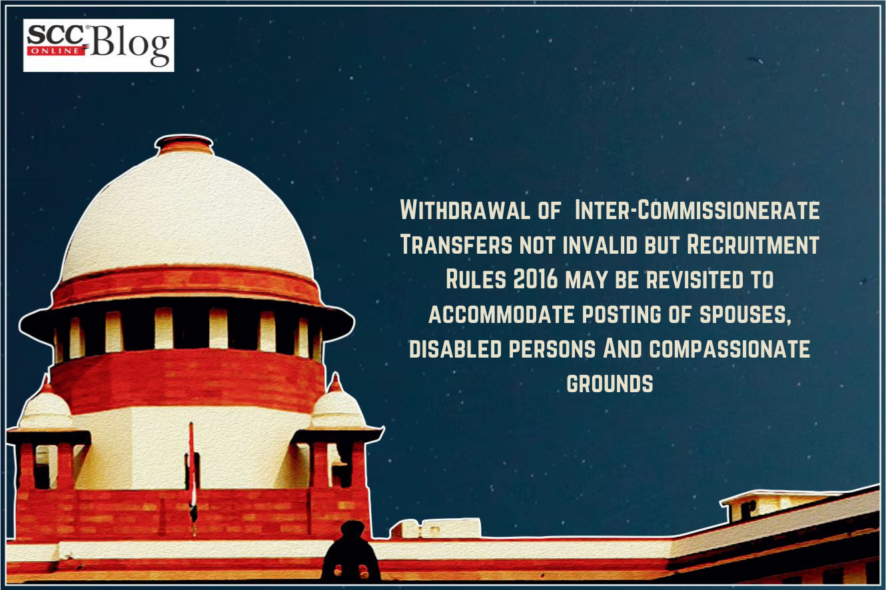Supreme Court: The bench of Dr. DY Chandrachud* and Vikram Nath, JJ has upheld the Kerala High Court verdict that had held that the Central Excise and Customs Commissionerates Inspector (Central Excise, Preventive Officer and Examiner) Group ‘B’ Posts Recruitment Rules 2016 (RR 2016) withdrawing the Inter-Commissionerate Transfers (ICTs) is not invalid as ICTs would violate the unique identity of each cadre envisaged under Rule 5 of RR 2016.
The Court, however, left it open to the Union of India to revisit the policy to accommodate posting of spouses, the needs of the disabled and compassionate grounds.
RR 2016 vis-à-vis CBIC Circular dated 20.09.2018
While clarifying that under RR 2016, there is no specific provision allowing for ICTs, the circular notes that Rule 5 stipulates that each CCA will have its own separate cadre, unless otherwise directed by the Board. Rule 5 has been construed to mean that given that each CCA is to have its own cadre, ICTs, which involve a transfer from one Commissionerate to another would no longer be permissible and accordingly all orders for such transfers which were issued on or after 26 December 2016 (the date on which RR 2016 were notified) would be non-est. The circular, however, allows that in exceptional circumstances, depending upon the merits of each case and on extreme compassionate grounds, such transfers may be allowed on ‘case to case on loan basis’ keeping in view the administrative requirements of the transferee and the transferred CCAs. However, the maximum tenure of such transfer has been fixed as three years which can be extended by a further period of two years.
Three Grounds on which the Circular was challenged
Ban on ICTs with respect to different classes of posts within the same service is discriminatory between Group A, B and C employees
The Court refused to accept this ground as there is no material on record to indicate that all three groups are pari materia with each other. It may be the case that the instances of abuse of ICTs is higher with respect to employees in Group B, as opposed to the other groups. Such decisions are taken keeping in mind the strength of the service and the needs of the administration
Gender Equality
The provision which has been made for spousal posting is in that sense fundamentally grounded on the need to adopt special provisions for women which are recognized by Article 15(3) of the Constitution. The manner in which a special provision should be adopted by the State is a policy choice which has to be exercised after balancing out constitutional values and the needs of the administration. But there can be no manner of doubt that the State, both in its role as a model employer as well as an institution which is subject to constitutional norms, must bear in mind the fundamental right to substantive equality when it crafts the policy even for its own employees.
“The State while formulating a policy for its own employees has to give due consideration to the importance of protecting family life as an element of the dignity of the person and a postulate of privacy. How a particular policy should be modulated to take into account the necessities of maintaining family life may be left at the threshold to be determined by the State. In crafting its policy however the State cannot be heard to say that it will be oblivious to basic constitutional values, including the preservation of family life which is an incident of Article 21.”
Equal treatment of disabled persons
The Rights of Persons with Disabilities Act 2016 is a statutory mandate for recognizing the principle of reasonable accommodation for the disabled members of society. The formulation of a policy therefore, must take into account the mandate which Parliament imposes as an intrinsic element of the right of the disabled to live with dignity.
The circular dated 20 September 2018 has taken into account, what it describes “exceptional circumstances” such as “extreme compassionate grounds”. Leaving these categories undefined, the circular allows for individual cases to be determined on their merits on a case-by-case basis, while prescribing that transfers on a “loan basis” may be allowed subject to administrative requirements with a tenure of three years, extendable by a further period of two years.
While proscribing ICTs which envisage absorption into a cadre of a person from a distinct cadre, the circular permits a transfer for a stipulated period on a loan basis. Whether such a provision should be suitably enhanced to specifically include cases involving (i) postings of spouses; (ii) disabled persons; or (iii) compassionate transfers, is a matter which should be considered at a policy level by the Board.
[SK Nausad Rahaman v. Union of India, 2022 SCC OnLine SC 297, decided on 10.03.2022]
*Judgment by: Justice Dr. DY Chandrachud
Counsels
For appellants and Intervenors: Senior Advocates Maninder Singh, Vibha Datta Makhija, PN Ravindran, Narender Hooda and Rana Mukherjee, and advocates Rishi Kapoor and Umakant Misra
For respondents: KM Nataraj, Additional Solicitor General



